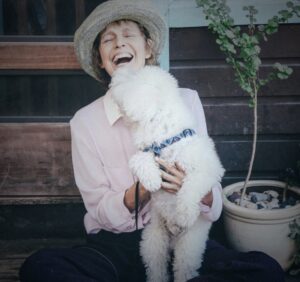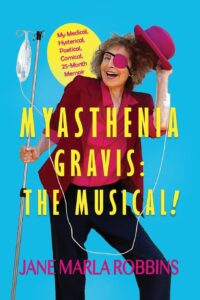As a poet and performer, Jane Marla Robbins has spent her life bringing stories to life on stage and through her writing. Now, she has turned her keen sense of humor toward a deeply personal experience – her journey with myasthenia gravis.
In her new book, Myasthenia Gravis: The Musical, My Medical, Hysterical, Poetical, Comical, 25-Month Memoir, Jane shares a funny and honest account of her first two years of living with MG. Her unique point of view blends poetry and screenplay-style storytelling to capture the uncertainties, the challenges, and the grace she has found in her “MG era.” She even finds a way to make an eye patch look fashionable.
In an interview with the MGFA, Jane opened up about her diagnosis, the role of humor in healing, and the power of creativity.
MGFA: To start, can you tell us about how you were diagnosed with myasthenia gravis?
Jane Marla Robbins: Absolutely. Imagine this: you’re in your car, and suddenly, you’re seeing double! I remember looking at my neighbors and saying, “I’m seeing four of you!” It was alarming. So, I called a friend whose husband is a doctor, and he told me to go straight to the ER. Of course, the ER I went to didn’t have an eye department, so they were at a loss.
I later saw an ENT specialist, and as is my nature, I tried to make light of the situation. I told him, “I see two of you!” and he immediately said, “Jane, this is very serious.” He referred me to an eye doctor who did a blood test, and from there, I was diagnosed with MG. It felt like an Olympic hurdle race—one doctor after another. Eventually, I found a doctor who really knew about MG.
I didn’t know what MG was at the time of my diagnosis. It was during the COVID pandemic, and my doctor told me not to go anywhere because my immune system wasn’t strong due to the treatment I was taking. That was the most challenging part—finding vitality and joy when you can’t do what you want, especially when you are a “people person.” We need human connection – it can actually help strengthen our immune system – but I couldn’t access that for a while.

MGFA: Your book is a mix of comic screenplays and poetry about your first two years with MG. Why was it important for you to write about your experience?
Jane: I was suddenly in this place where I needed to notate what was going on because my body was saying different things each day. To make decisions on which medicines you should take, you try different options and take notes on how you feel. You are writing down so much, all the time.
I wasn’t thinking about writing a book—I was just writing. I wasn’t judging what I wrote because I was in a place, mentally and emotionally, I’d never been in before. The poems just came to me. My very upbeat doctor at UCLA told me, “The goal with myasthenia is always to get the patient back to waterskiing.” So, the way my mind works, I wrote a poem about it.
At first, I was just making myself laugh. But then every time I joked, “Did they really have to add ‘gravis’?,” other people laughed. So, I kept going. I was cataloging my anger, my terror, my state of grace, my humor – all of it.
A friend pointed out that the initials MG were the same as Martha Graham’s, who is one of my heroes, and I felt that was like a sign. That inspired me to write an article about resilience—about getting knocked down but getting back up every time.
MGFA: How does humor help you cope?
Jane: I think humor saved me. It saves people because the reality is so terrifying. Somehow, the distance of humor makes it bearable. I could look at my situation and not be afraid because I was laughing.
Truth can be a hard pill to swallow, but if you’re laughing, your mouth is open—so I just pop the truth right in!
MGFA: You have now lived with MG since 2021. What advice do you have for those newly diagnosed?
Jane: First, read my book! But seriously, know that the journey may not be an easy one. It may take the doctors longer than you would like to have your symptoms resolve. Before our talk today, I made sure to take all my meds to keep my voice up. I’ve learned to deal with all my symptoms so I don’t feel like a victim. I think that’s good advice for everyone – learn how not to feel like a victim.
I was lucky to find support through the MGFA’s MG Friends program. A retired doctor who had MG guided me, offering both personal experience and her medical expertise. Her generosity and kindness helped me through some tough times. Even recently, when I had to evacuate because of wildfires, she reached out to offer me a room.
Also, allow yourself to “feel your feelings.” I developed a process for myself: first, I acknowledged my anger – something I was never taught to do as a little girl. Then came fear – what will my life look like now? After that, grief. Nobody likes to cry, but it’s necessary. Finally, acceptance and even embracing the situation. On good days, I remind myself, “I can do this.”
MGFA: Why should people read your book?
Jane: Because it makes people feel less alone. Doctors tell me that when their MG patients read it, they feel better. They feel comforted to know that someone understands. I’ve had readers tell me, “That’s my story!” And, of course, my book makes people smile.
We are often afraid to show vulnerability, but in sharing my story, I’ve found that it helps others open up, too. When I was in the hospital, half-paralyzed, the nurses would come into my room for a laugh. Humor is a powerful tool.
***********************
Below, read an excerpt from Jane Marla Robbins’ book, Myasthenia Gravis: The Musical.
**********************
HEY! YOU! MY ANTIBODIES!
What’s going on, guys? You’re attacking
what you should hold holy.
Could you all just calm down?
What’s up with you?! Brawling? Dancing?
Singing? You fighting, drunk?
Bacchanalian revels do often turn deadly.
All those scientists, any of them
ever gone in there, got a good look?
Hey, you! My antibodies! How can I
help you do your proper work?
Maybe put you in some clean, crisp
straightjackets, calm you down,
feed you happy food, soup and chocolate,
steak and asparagus,
so you have no need of my
once happy, healthy body.
And both of us will be at peace.
TWENTY-SEVEN REASONS TO BE GRATEFUL
I’m grateful that I can finally walk without wobbling. And that I can talk. And can be understood. I’m grateful that I can laugh and make other people laugh. I’m grateful that I sometimes feel hopeless, and that I emerge, like a whale from the depths, into the light.
I’m grateful I have mountains and trees close to my house and that I sometimes remember they have lessons for me. I’m grateful there’s a café around the corner so that in the morning I can go sit on the patio before too many people get there who may be sick. So that I’m around people and have human contact, so my body can produce some serotonin. I’m grateful that I can feel grateful.
I’m grateful I can write (this book). I’m grateful I love food and that I can chew again. I’m grateful I can once again spread my fingers like a starfish. I’m grateful I can lift my arms up over my head again, as if celebrating a victory. Which I am.
I’m grateful that if I bruise myself and that it’s even black-and-blue, that I sometimes remember remedies that can heal it, and I use them. I’m grateful for flowers, and deer, and coyotes, and people who are kind, generous and loving. I’m grateful for my grandmothers.
I’m grateful when I don’t see double. I’m grateful when I feel I understand one of my doctors. I’m grateful that my dog sleeps on my bed, so in the morning I can reach out and touch another living being that loves me – maybe not a human, but this helps me feel I’m not alone.
I’m grateful that my dog is a good caretaker. He even refuses to go out if I seem too sick to take him out. I’m grateful that he is always sympathetic when I’m feeling sad or glad or crazy angry. I’m grateful that my dog is healthy, and doesn’t have MG.


